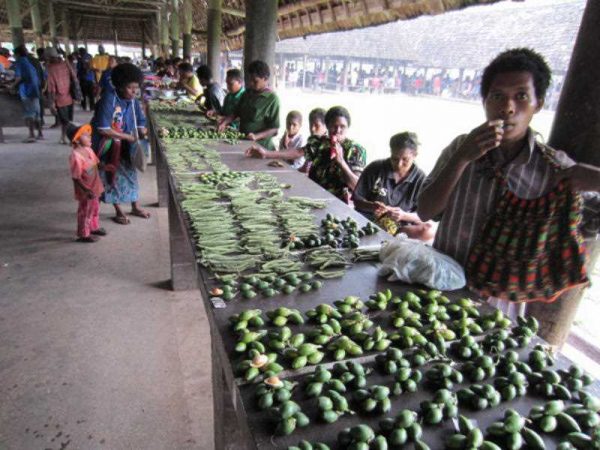After years of effort, a national informal economy policy was adopted by the National Executive Council (NEC) in 2011, driven by the then minister for community development, Dame Carol Kidu. Sadly, the policy lost momentum after Dame Carol departed the ministry and retired from politics. Three changes of minister and the loss of continuity in the senior bureaucracy have contributed to stasis.
As Dame Carol found, gaining support for the policy was a difficult task in the face of entrenched antipathy to the ‘informal sector’ among some members of the PNG political class. At both local and national levels there are many examples of this antipathy, which reflects an elite psychology distanced from ordinary people who throng the streets and markets of the towns. It suggests an inferiority complex, a sense of shame that such people are a barrier to ‘modernisation’.
The epicentre of this disgust is the street trade in buai (betel nut). While city authorities are entitled to feel that public consumption resulting from the trade is a blight on towns and a risk to public health, it is also a model domestic industry, in terms of the numbers of people it supports, the income generated, and the efficiency of its logistical system.
It was quite predictable that vendors of buai and other commodities would be cleared from the streets of Port Moresby as part of a clean-up in preparation for the South Pacific Games. Unfortunately, what we cannot expect any time soon is a sensible attempt to solve the dilemma — not of the buai trade itself but of the public consumption of betel nut — while retaining the considerable economic benefits it yields to low-income people.
It is a mark of the immaturity and limited scope of the PNG informal economy that it still lacks a sufficiently diversified set of activities, so that a single informal industry has assumed such notoriety. The national policy adopted by the NEC suggests measures to encourage a more diverse set of informal activities, but implementation of these has been slow due to budget constraints. PNG’s informal economy is too small, not too large, and it is still too limited in scope, scale and contribution to national output. A better functioning and more diverse informal economy is seen as necessary to increase the efficiency of linkages between mineral enclaves and the broader population.
The new Minister for Community Development, Youth and Religion Delilah Gore and Departmental Secretary Anna Solomon now give hope that the national policy can gain traction and impress itself on a broader range of government agencies.
The department seems to have a renewed sense of ownership and commitment to the policy. While it was adopted too late to figure in the Medium Term Development Program 2011–15 (MTDP), the department must now seize the opportunity to have the policy’s perspectives on informality reflected in a forthcoming revision.
The original trigger for the national informal economy policy was earlier, ground-breaking legislation, the Informal Sector Development and Control Act 2004. This unusual law defined ‘informality’ in the PNG context and provided for the regulation of informal economic activities so as to nurture their growth.
The NEC called a review of the 2004 legislation, which will likely be completed this year. There is some concern that without the completed review, any recommendation for a model law to be adopted by provincial and local governments would face monitoring, coordination and implementation problems. We hope the review will recommend a clear role for the Department of Community Development itself, whether as implementer and regulator, or simply as coordinator.
The new law should be implementable, not one as easily ignored as the current one. Responsibility for implementation should be identified at the provincial, district and local government levels. Making the link between the national government and the provincial and local governments clear in the law is critical, something not done in the current legislation.
Another issue concerns the need for the revised law to distinguish informal economic activity clearly from that of small and medium enterprises, which is currently the subject of separate government attention. To avoid inter-agency conflict, it is necessary to define ‘informality’ clearly and to emphasise the quite important differences in culture and operations between ‘small’ and ‘micro/informal’ enterprise and their different regulatory needs.
When a new law is finally in place, aligned with the national policy adopted in 2011, there will be a need for continuous improvements in the policy framework for supporting socially-beneficial informal economic activity. This is an area requiring support from development partners and government.
Development partners are beginning to understand the important role of the informal economy, but greater investments are required of them — especially focussing on empowering women, who are the majority of participants. Women must understand their legal rights, while officials responsible for the regulation of informal economic activity must be trained for the role.
Periodic surveys of the informal economy, focussing on the scale and scope of activities, and estimates of their economic contribution, will guide such policy improvement. Such surveys should report on supply-side constraints and bottlenecks affecting the productivity and growth of the informal economy and on bureaucratic and other obstacles to transition from ‘micro’ to ‘small’ (or informal to formal) enterprise for those with the potential to make that progression. These efforts would complement the current government emphasis on the SME sector.
Busa Jeremiah Wenogo is an economist working with the Consultative Implementation and Monitoring Council (CIMC) in Port Moresby. John Conroy is a visiting research fellow at the Crawford School of Public Policy, ANU.

